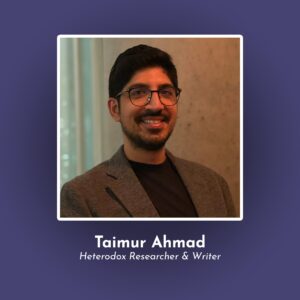
Show Summary
On this episode, Nate is joined by recent Stanford graduate and biophysical researcher Taimur Ahmad to discuss energy inequality within and across nations. Taimur offers a unique perspective as someone who has spent years studying the issues of the polycrisis, while also having experience growing up in Pakistan and living in the United States. How does the culture of a nation and its access to energy interrelate to create huge differences in the daily lives of the people who live there? How do the looming implications of climate change and energy depletion impact the relationship between the Global North and the Global South? And how do issues of class, wealth, and ‘fictitious capital’ interplay with the larger poly-crisis at hand?
About Taimur Ahmad
Taimur Ahmad is the author of the Fictitious Capital newsletter where he writes about understanding the base layer of the global system: money/finance, energy, and raw materials. He studied economics at Georgetown University in Qatar and recently completed a graduate degree from Stanford University where he focused on energy policy and electricity markets. After working in agricultural development in Pakistan, he worked in the Middle East supporting clients across energy, CP&I, and national development. From these experiences, he realized the importance of reframing contemporary socioeconomic issues in an energy and ecological systems framework. His work is now focused on exploring the intersection of development in the Global South, degrowth/post-growth, MMT, and leftist social theory.
In French, we have a motto that says that a simple drawing is often better than a long explanation. Jean-Marc Jancovici Carbone 4 President
That’s very understandable because with left atmosphere thinking, one of the problems is that you see everything as a series of problems that must have solutions. Iain McGilchrist Neuroscientist and Philosopher
We can’t have hundreds and hundreds of real relationships that are healthy because that requires time and effort and full attention and awareness of being in real relationship and conversation with the other human. Nate Hagens Director of ISEOF
This is the crux of the whole problem. Individual parts of nature are more valuable than the biocomplexity of nature. Thomas Crowther Founder Restor
Show Notes & Links to Learn More
Download transcript00:00 – Taimur Ahmad, Fictitious Capital Newsletter + Info
05:41 – Inequality in the U.S.
06:00 – Polarization in the U.S. comparatively to other countries
06:35 – Pakistan population and GDP, US population and GDP
09:23 – Pakistan energy imports and vulnerability to price fluctuations
09:48 – Impact of Russia/Ukraine war on Pakistan
10:03 – Pakistan Floods
10:13 – Pakistan net importer of food, wheat
10:27 – Pakistan food inflation
12:25 – California black outs from wildfires
13:22 – Decarbonization and the fundamentals of energy
18:01 – Inequality in Pakistan
18:45 – Taking over farmland from poor farmers as a way to reinforce material inequality
19:20 – Social and material inequality reinforcing effect
19:32 – Climate in Pakistan
19:52 – Climate impacts, increased heat and weather events
20:56 – Urban Heat Island effect
22:01 – People on the ground often have an intuitive awareness of changing climate
22:34 – What percentage of the population has air conditioning in Pakistan
25:27 – Global North responsible for 80% of global GHG emissions
25:39 – Global North war disrupting natural gas supply, primarily affecting the Global South
28:40 – Global north exploitation and extraction from the Global South
30:11 – Class warfare
30:55 – Degrowth
31:55 – Small group of people using up most of Earth’s resources
34:35 – Social change of those in power is a rare occurrence
35:50 – New US Industrial Policies
37:25 – “The challenge of modernity is to live without illusions and without becoming disillusioned. I’m a pessimist because of intelligence, but an optimist because of will.” –Antonio Gramsci
39:30 – Fictitious Capital
39:43 – Marx, Capital Vol. 3
40:36 – 2008 financial crisis, mortgage securities not accurately representing value
46:06 – Recent climate policies
46:50 – Types and stages of an social movement
49:40 – New Stanford Sustainability School
50:20 – Beyond Growth
51:40 – Paul Ehrlich
54:20 – Affect Theory
55:45 – Enlightenment and the shift of humans’ relationship with nature
56:24 – Hobbes, Locke, The State of Nature
59:30 – Ecosystems and natural features in Pakistan
01:01:52 – Joslin Faith Kehdy + TGS Podcast
1:08:10 – Robert Sapolsky







